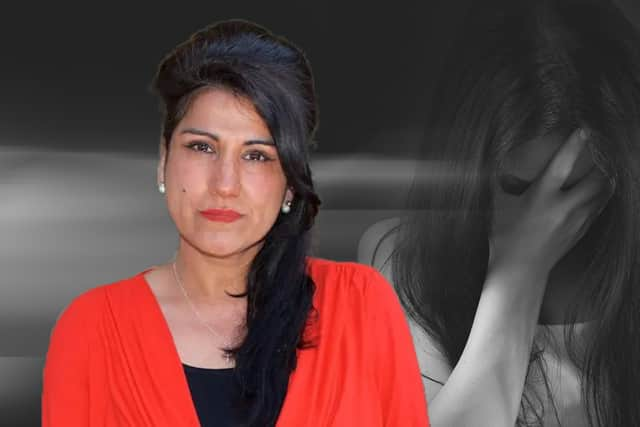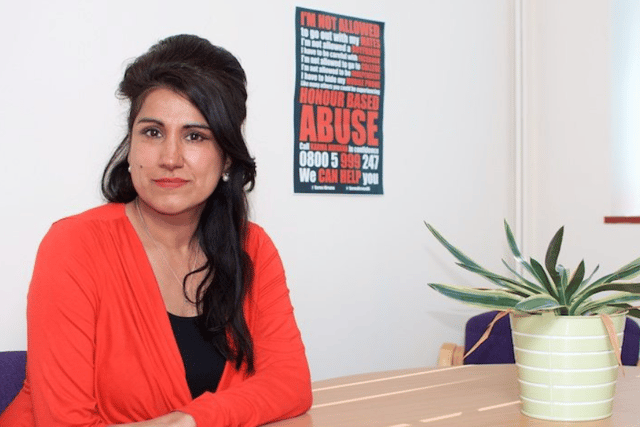‘My family has disowned me for 43 years as I didn’t marry a stranger’: a child marriage survivor’s story
This article contains affiliate links. We may earn a small commission on items purchased through this article, but that does not affect our editorial judgement.
and live on Freeview channel 276
“I don’t want to marry a stranger.” That was all Jasvinder Sanghera could think when, at the age of 14, her parents sat her down in their living room and showed her a photo of the man they had chosen to be her husband.
As she stared at the picture of the older man - a man who she had never met - Jasvinder learnt that she had been promised to him since she was just eight years old. She was told that in a few months’ time, she would be taken away from Derby, England, where she had lived her whole life, and flown to India, where the wedding would take place.
Advertisement
Hide AdAdvertisement
Hide AdIt felt like a nightmare, but Jasvinder had known this day was coming for years as she had watched the same thing happen to her sisters. “None of them ever spoke of what happened in India,” Jasvinder told NationalWorld.
“But they were different when they returned. They acted the part of the traditional wife, they wore Indian clothing, and none of them went back to school.” Instead, she explained, they were focused on immigration applications and becoming a sponsor, so that their new husbands could move to the UK.
Growing up, Jasvinder hadn’t really questioned this. “What you need to understand,” she explained, “is that we learn our rights and wrongs from our parents.
“So when, from the age of seven, you’re told, ‘as a girl, you don’t speak unless spoken to’, ‘as a girl, you don’t make eye contact with men’, and, ‘as a girl, we will find you a nice husband and you will marry him when we say’, you believe this is right. You believe it’s normal. It’s a form of grooming.
Advertisement
Hide AdAdvertisement
Hide Ad“You’re also taught that this is part of your culture, your religion, your country’s tradition,” she continued. “And so if you love your family, and don’t want to bring shame and dishonour upon them, this is what you will do.”
But when it became a reality for Jasvinder, she realised with every bone in her body that she did not want this - and told her mother so. “I don’t want to marry a stranger,” she said aloud. And with those words, Jasvinder’s world imploded.


She was locked in her bedroom for weeks, told she would not be released until she agreed to marry. She was driven to desperation in there, and attempted to overdose - thinking it would mean her parents would take her to hospital and she could tell someone what was happening.
But her mother just fed her black coffee and kept her walking to flood the drugs out of her system. One of her sisters told her: “If you think trying that’s going to change anything, you’re wrong.”
Advertisement
Hide AdAdvertisement
Hide Ad“I eventually gave in,” Jasvinder said. “I couldn’t take it anymore. And as soon as I agreed to the marriage, everything was wonderful. Everyone in my family was so happy with me. But they didn’t know that I was plotting something.”
Jasvinder had a secret boyfriend at the time, who had told her he would help her escape. The moment they got the chance, they did just that - fleeing to Newcastle.
‘You are dead to this family’
Jasvinder was soon reported missing to the police, and her boyfriend’s sister, who was also a friend of Jasvinder’s, was beaten up for information on where they had gone. “She knew where we were,” Jasvinder said. “But she never told a soul.”
Eventually however, the police tracked them down - and Jasvinder knew it was her last chance. She begged the police officer not to send her home as she tried to explain the situation: “My parents are marrying me to a stranger. They’ll give you an award-winning performance on the doorstep of why they won’t, but the minute you’re gone, I’ll be in danger again.”
Advertisement
Hide AdAdvertisement
Hide Ad“He looked at me,” Jasvinder said, “and went: ‘don’t worry, I see this all the time.’ And I just felt this immense sense of relief that he believed me - that he didn’t dismiss what I was saying.”
She was told she didn’t have to return home, but had to call her family and tell them she was safe. “I rang home, and I said to my mum ‘I want to come home, I want to be with my family, but I don’t want to marry a stranger’.”
Her mother refused. “You can only come home if you agree to marriage,” she insisted. When Jasvinder said no, her mother said something she will never forget.
“You are dead to this family. I hope one day you have a daughter who does to you what you have done to me, and then you will know what it feels like to raise a prostitute.”


‘I’ve been disowned for 43 years’
Advertisement
Hide AdAdvertisement
Hide Ad“That’s the choice,” Jasvinder explained. “You can have your family, but no freedom. Or you can have freedom, but no family. I chose freedom.”
Jasvinder has now been “disowned” for 43 years, and in that time, has come to realise it was the right choice. “My children will never have to inherit that legacy of abuse,” she explained.
But there were several moments where she regretted her decision. “Every day I was living in hope that my family would talk to me and forgive me,” she said. “I kept thinking, if I had said yes, if I had agreed to marry this man, if I had agreed to be raped on my wedding night - because let’s be clear, that’s what it is - then I would have my family.”
Jasvinder had to find out that her brother had died through Facebook, as her family refused to contact her to tell her. And she only discovered her older sister Robina’s tragic fate because a neighbour told her to phone home. “What happened to Robina is what brought me to campaigning,” Jasvinder explained.
‘It was better she take her life than dishonour her family’
Advertisement
Hide AdAdvertisement
Hide AdJasvinder’s sister Robina was married at the age of 14, as her parents had wanted for all their daughters. Her husband did not get granted residency in the UK, and so she joined him in India, but the marriage soon turned abusive.
Robina begged her parents to allow her to return home, and they eventually relented. They then allowed her to remarry another man who “ticked the boxes by being Indian, Sikh, and of the same caste,” Jasvinder explained, “but the message was - if anything goes wrong in this marriage, you have made your bed and have to lie in it. You can never leave him.”
However, Robina’s second husband was abusive too - but she saw no way out because of what her parents had told her. So Robina killed herself by setting herself on fire.
“When I called my mother, she told me it was better that Robina take her own life than dishonour her family,” Jasvinder said. “That’s when I had an epiphany. Nothing was ever going to change.
Advertisement
Hide AdAdvertisement
Hide Ad“I finally owned the fact that I was a victim, not a perpetrator. I hadn’t done anything wrong. I was a child.” And so Karma Nirvana was born.
What is Karma Nirvana?
Jasvinder set up charity Karma Nirvana to campaign against forced and child marriages, and bring an end to ‘honour-based abuse’. She told NationalWorld: “People had, and many still have, the attitude of ‘that sort of thing doesn’t happen here. It only happens in foreign countries’.”
But it does still happen in the UK. In fact, since its launch in 2008, Karma Nirvana’s helpline has received more than 100,000 calls from victims.
Over the years, Karma Nirvana has helped campaign for the criminalisation of forced marriage, which came about in 2014, and for the change to the legal age of marriage in England and Wales, which rose to 18 in February 2023.
Advertisement
Hide AdAdvertisement
Hide AdThe government said this will “better protect vulnerable children from the damaging impact of forced marriage”, something Jasvinder agrees with. She remarked: “This is a huge step because children growing up in these households are frequently told child marriage is normal, but now, there’s a clear sign that says it’s not. But what matters more is where we go from here, as it will take a full societal approach to properly protect victims.”
Jasvinder explained that raising awareness is incredibly important as “people need to know it’s wrong and against the law.” She recalled how, when her sisters were dropping out of education, “no one said anything” - but if someone had, she may have opened up to a teacher about what was going on.
“Schools are at the heart of prevention,” she insisted. “But to do that, people need to understand the complexities. They need to understand that the perpetrators are parents. And they need to understand that saying this is wrong is not racism. It’s not disrespecting tradition. Cultural acceptance does not mean accepting the unacceptable.
“So this is where the work starts - we need to raise awareness, we need to protect children, and we also need to continue campaigning so that the law changes in Scotland too.”
Advertisement
Hide AdAdvertisement
Hide AdYou can read more about the work Karma Nirvana does on its website. If you need help, you can call the charity’s helpline for free on 0800 5999 247.
If this story has affected you, Samaritans are here – day or night, 365 days a year. You can call them for free on 116 123 or visit samaritans.org to find your nearest branch.
Comment Guidelines
National World encourages reader discussion on our stories. User feedback, insights and back-and-forth exchanges add a rich layer of context to reporting. Please review our Community Guidelines before commenting.
